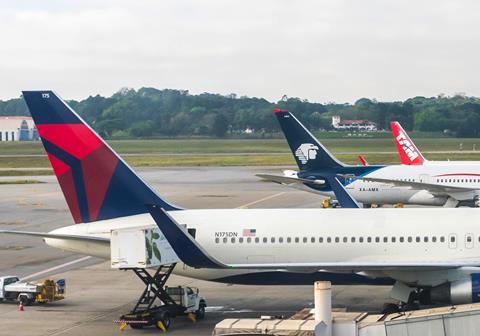The US Department of Transportation (DOT) has tentatively ordered Delta Air Lines and Aeromexico to unwind the joint venture that the two carriers have been pursuing since December 2016.
The DOT says in its decision that it’s concerned about how Mexican government actions are impacting US airlines at Mexico City’s Benito Juarez International airport.
“Actions taken by the Mexican government regarding operations at MEX have been raised by the US government with counterparts at the highest levels within the government of Mexico in formal consultations as being fundamentally out of compliance with the existing bilateral air service agreement and international norms governing capacity management at airports,” the tentative decision, published on 26 January, reads.

“After continued consultations that have not altered the current course, the department tentatively concludes that the condition precedent necessary for consideration and continuation of [antitrust immunity], namely the adherence by the government of Mexico to its obligations under the US-Mexico Aviation Agreement, is no longer present.”
The two airlines will have until the end of October to unwind the JV, the decision says.
“This time period should provide sufficient time for the joint applicants to unwind segments of the joint venture and to modify existing agreements to be consistent with an arms-length non-immunized alliance.”
Aeromexico said on 27 January that it was “reviewing the resolution” and the airlines “will jointly and in a timely manner submit arguments enabling the authority to make a final determination”.
Atlanta-based Delta, meantime, says on 29 January that it is ”deeply disappointed” by the decision.
”This unprecedented, regulatory overreach by the DOT will cause significant harm to consumers traveling between the US and Mexico,” the company says. ”Mexico is our country’s second largest trading partner and the Delta/Aeromexico Joint Cooperation Agreement, which is responsible for the launch of 15 routes between the US and Mexico, has been critical to connecting communities and businesses in both countries, while generating substantial economic benefits for US businesses.”
The parties have 14 days to submit their responses to the tentative judgement, and it will become final seven days after that.
In July 2023, the DOT also suspended consideration of an application for antitrust immunity by Allegiant Air and Viva Aerobus for the same reason.
“Despite further formal engagement with the Mexican government, no progress has been made at this time on resolving core issues related to the implementation of the US-Mexico Air Transport Agreement,” the DOT says.
The decision is a blow to the two carriers, which have successively built out their partnership since the US government last September lifted Mexico’s safety status back up to Category 1, the highest level, after it had been relegated to Category 2 for more than two years.
In recent months, the Mexican government has been throttling down traffic movements at Benito Juarez airport, Mexco City’s busiest, in favour of the newer but more distant Felipe Angeles International airport. That has angered operators and international airline lobby groups like IATA.
Last year, the older airport accommodated 62 aerial operations per hour. In early 2023, the number was reduced to 52, with the explanation being that there would be some infrastructure improvements made. Those never materialised, and the authorities decided to reduce the hourly operations to 43. That new rule was to have gone into effect in October, but airlines have successfully been able to lobby to push those changes into 2024.
Updates on 29 January to add a statement from Delta Air Lines.


























